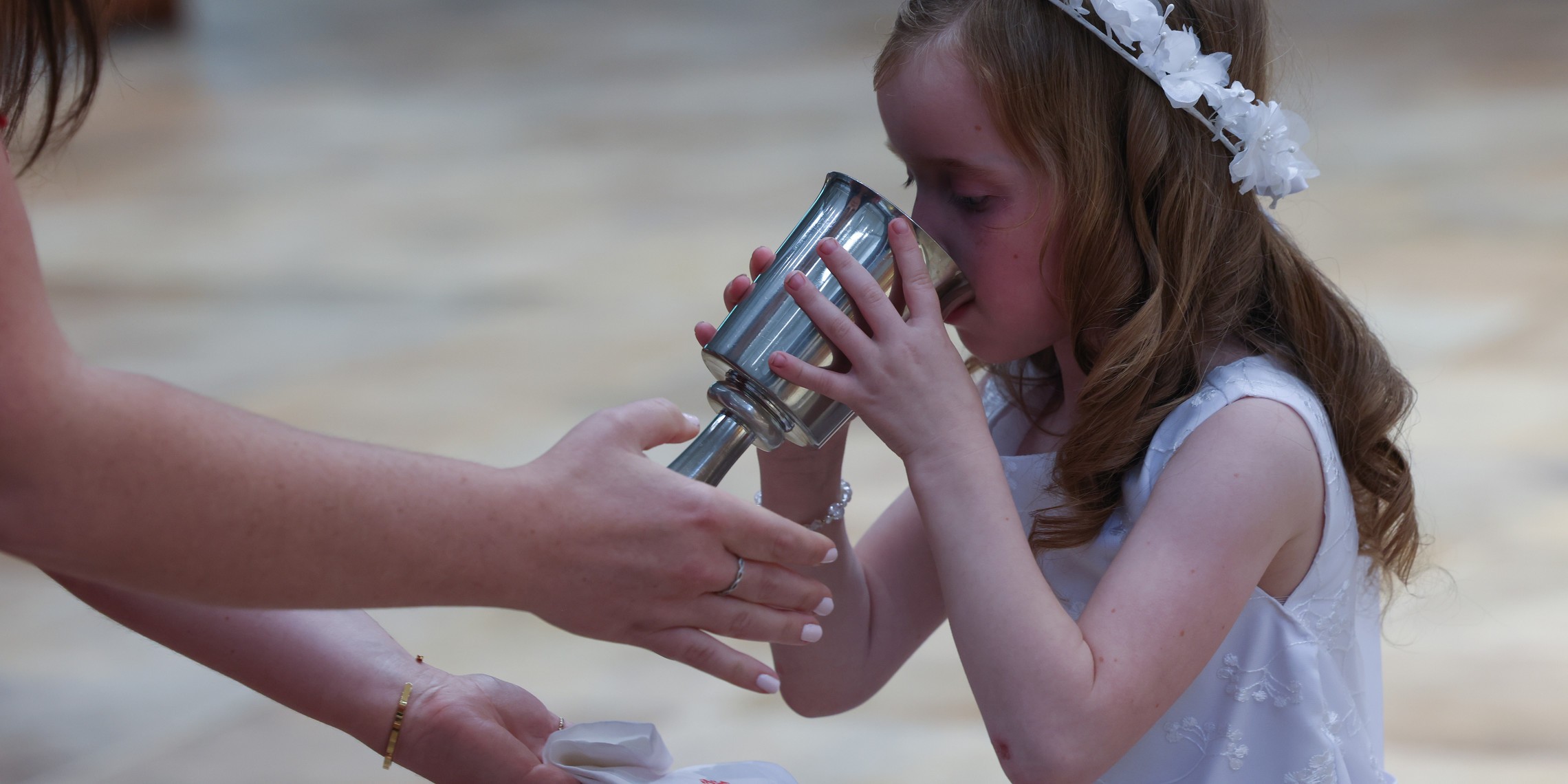Somehow the thought of working from home sounded so much more glamorous than it really is. Many of us have been tele-commuting now for two or three weeks in our dens, spare bedrooms, basements or kitchens...and it’s just..not..quite what we imagined. The month of March flew by with constant news updates about the virus and what businesses were closing next. We’ve learned to adapt to being at home, becoming creative about how we do things like using Facetime to let a friend peek inside our clothes dryer to suggest a repair all while staying properly distanced. We’ve seen the advent of drive through confessionals on the news and some priests taping selfies of their parishioners to the pews in order to celebrate private Masses with their flock.
Lent officially comes to an end on Holy Thursday and perhaps that means we get to eat sweets or taste an ice-cold beer again. Daffodils and hyacinths already adorn our gardens, but our bright colored Easter outfits will need to stay at home this year. Focus and discipline for our Lenten practices might have been a bit easier with closed restaurants and more time on our hands to pray. Perhaps our “stay at home” order allowed us to pray a daily Rosary and read our Bible more. Knowing we are all united in this uncertainty has hopefully made us kinder and more compassionate this Lent. Now we find ourselves at Holy Week, the week the Church has been waiting for, fasting for and praying for and we can’t celebrate it the way we are used to. What is God trying to teach us this year as the Resurrection of Jesus, our Lord, our Savior, and our Redeemer draws near? Have we been given a gift amid adversity to incorporate and celebrate Holy Week after it ends?
Perhaps looking at this incredible week with fresh eyes and in light of where we stand in history can help us to be different Catholics when we return to the lives we have temporarily halted. Holy Week begins on Palm Sunday and then enters the Sacred Triduum on Holy Thursday at the Mass of the Lord’s Supper.
Palm Sunday
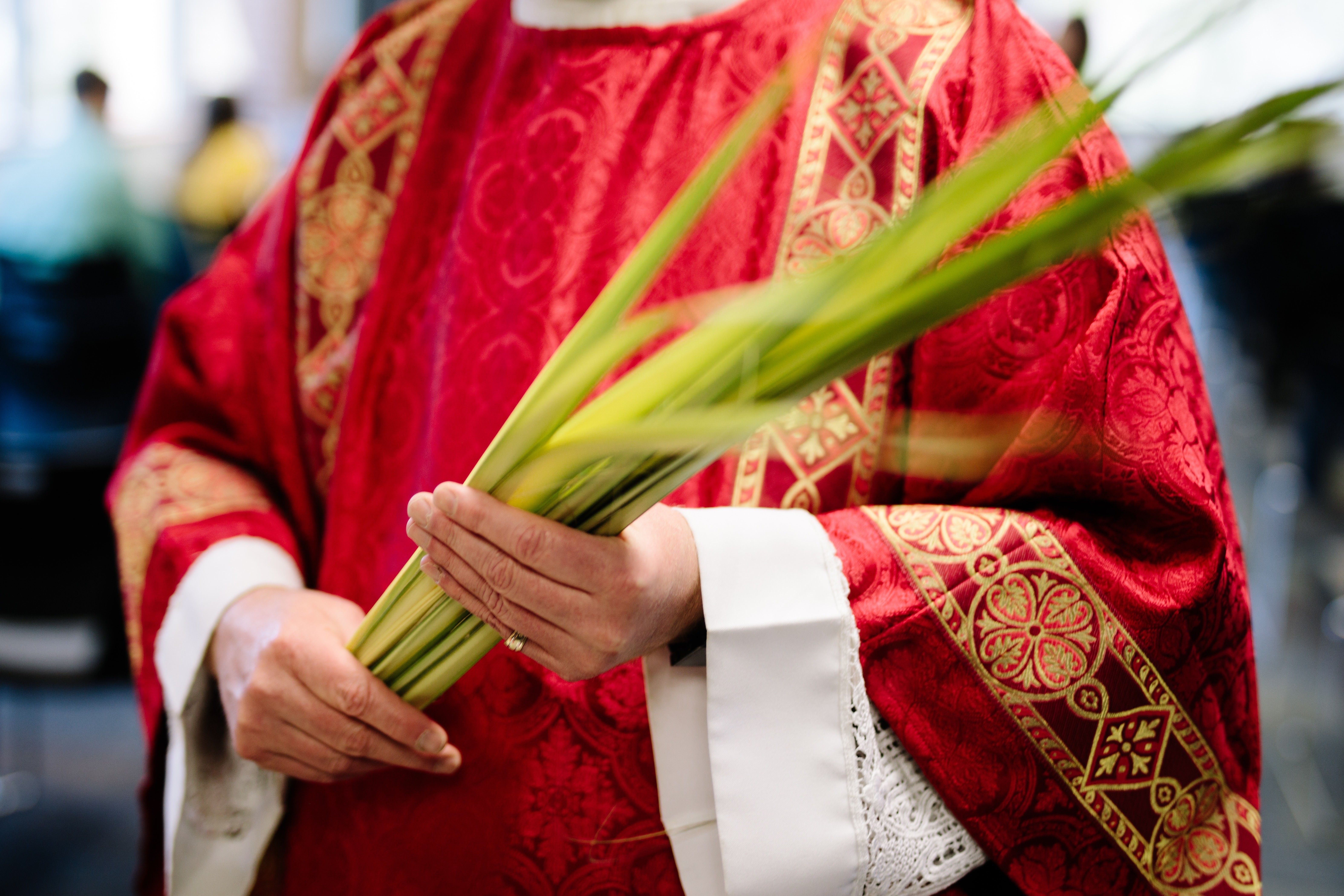 Palm Sunday commemorates Jesus’ entry into Jerusalem where He was greeted as a King upon His arrival. Waving palm branches has significance dating back to the Old Testament as a symbol of welcoming a King or military conqueror. The crowds that accompanied Jesus into Jerusalem waved palm branches, shouted “Hosanna” and laid their cloaks on the ground to honor Him. On this day, we begin with a procession of the entire congregation into the church. We carry the blessed palms and we enter the Mass joyously waving them and welcoming Jesus in our midst. Palm Sunday is also called Passion Sunday because we read the story of Christ’s Passion that day. It helps us to focus on the story that we will live out with Jesus in the coming days and recalls what an incredible gift He gave to us. The Passion is read by three people, a narrator, someone who reads the part of the people and the priest who reads the words of Christ. Familiarity with the Passion narrative can make us gloss over verses like John 19:1 “Then Pilate took Jesus and had Him scourged.” Jesus endured a beating and tearing of His flesh so severe that it shortened a normal crucifixion death from a few days to merely three hours. We’ll hear the Passion again on Good Friday but on Palm Sunday, we make our hearts ready for the terrible suffering Jesus will endure. Read the Passion before Palm Sunday, really read it, and put yourself in the place of Christ and what He suffered. This year, the palms will not be blessed, we won’t fold our palm crosses, our homes will not be graced with this sacramental and there will be no joyful procession into the church.
Palm Sunday commemorates Jesus’ entry into Jerusalem where He was greeted as a King upon His arrival. Waving palm branches has significance dating back to the Old Testament as a symbol of welcoming a King or military conqueror. The crowds that accompanied Jesus into Jerusalem waved palm branches, shouted “Hosanna” and laid their cloaks on the ground to honor Him. On this day, we begin with a procession of the entire congregation into the church. We carry the blessed palms and we enter the Mass joyously waving them and welcoming Jesus in our midst. Palm Sunday is also called Passion Sunday because we read the story of Christ’s Passion that day. It helps us to focus on the story that we will live out with Jesus in the coming days and recalls what an incredible gift He gave to us. The Passion is read by three people, a narrator, someone who reads the part of the people and the priest who reads the words of Christ. Familiarity with the Passion narrative can make us gloss over verses like John 19:1 “Then Pilate took Jesus and had Him scourged.” Jesus endured a beating and tearing of His flesh so severe that it shortened a normal crucifixion death from a few days to merely three hours. We’ll hear the Passion again on Good Friday but on Palm Sunday, we make our hearts ready for the terrible suffering Jesus will endure. Read the Passion before Palm Sunday, really read it, and put yourself in the place of Christ and what He suffered. This year, the palms will not be blessed, we won’t fold our palm crosses, our homes will not be graced with this sacramental and there will be no joyful procession into the church.
The Chrism Mass
At the Chrism Mass, normally celebrated on Tuesday of Holy Week in the Archdiocese of Cincinnati, Archbishop Schnurr blesses the Holy Oils that the parishes of the Archdiocese will use for the Sacraments throughout the year. The Archbishop blesses three oils. The Oil of Catechumens is used in Baptism to anoint the one to be baptized on the chest prior to being baptized with water. The Oil of the Infirm (sick) is used to anoint the forehead and hands of the person receiving the Anointing of the Sick. The Holy Chrism is used in Baptism and Confirmation by anointing the forehead and in Holy Orders by anointing the hands of a priest and the head of a bishop. Holy Chrism is scented with balsam perfume. Archbishop Schnurr will breathe on the Holy Chrism in the same way that Jesus breathed on the Apostles in John 20:22 “And when he had said this, he breathed on them and said to them, “Receive the Holy Spirit.” Since the Archbishop cannot be physically present at every baptism and confirmation in our Archdiocese, he can be symbolically present through the holy oils he blesses. At the Chrism Mass, the priests of the Archdiocese renew the promises of their ordination to serve God, the Bishop, and His people.
Spy Wednesday
 Spy Wednesday is traditionally thought to be the day that Judas betrayed Jesus to the Sanhedrin for thirty pieces of silver. Thirty pieces of silver was the going rate to purchase a slave. This day Jesus was anointed with expensive oil from an alabaster jar, signifying His impending death. (Mt 26:6-13) What a contrast between being bartered for as a slave and being anointed as royalty. The Ancient Office of Tenebrae is celebrated this day. Tenebrae is a Latin word meaning “shadows” or “darkness.”. The service consists of the Psalms, reading of scripture, the chanting of the Lamentations of Jeremiah and the singing of the great Passiontide choral settings. In modern liturgical practice, Tenebrae is sung only on Wednesday evening of Holy Week. The mood of the service is somewhat somber, quiet and reflective; its dramatic features are the gradual extinction of a fifteen-branch candelabra in the center of the sanctuary and all the lights in the cathedral, as the church contemplates the temporary triumph of the prince of darkness over the light of the world, and a loud noise (strepitus) at its conclusion, suggesting the earthquake described in the passion narratives. (Archdiocese of Cincinnati website)
Spy Wednesday is traditionally thought to be the day that Judas betrayed Jesus to the Sanhedrin for thirty pieces of silver. Thirty pieces of silver was the going rate to purchase a slave. This day Jesus was anointed with expensive oil from an alabaster jar, signifying His impending death. (Mt 26:6-13) What a contrast between being bartered for as a slave and being anointed as royalty. The Ancient Office of Tenebrae is celebrated this day. Tenebrae is a Latin word meaning “shadows” or “darkness.”. The service consists of the Psalms, reading of scripture, the chanting of the Lamentations of Jeremiah and the singing of the great Passiontide choral settings. In modern liturgical practice, Tenebrae is sung only on Wednesday evening of Holy Week. The mood of the service is somewhat somber, quiet and reflective; its dramatic features are the gradual extinction of a fifteen-branch candelabra in the center of the sanctuary and all the lights in the cathedral, as the church contemplates the temporary triumph of the prince of darkness over the light of the world, and a loud noise (strepitus) at its conclusion, suggesting the earthquake described in the passion narratives. (Archdiocese of Cincinnati website)
Holy Thursday
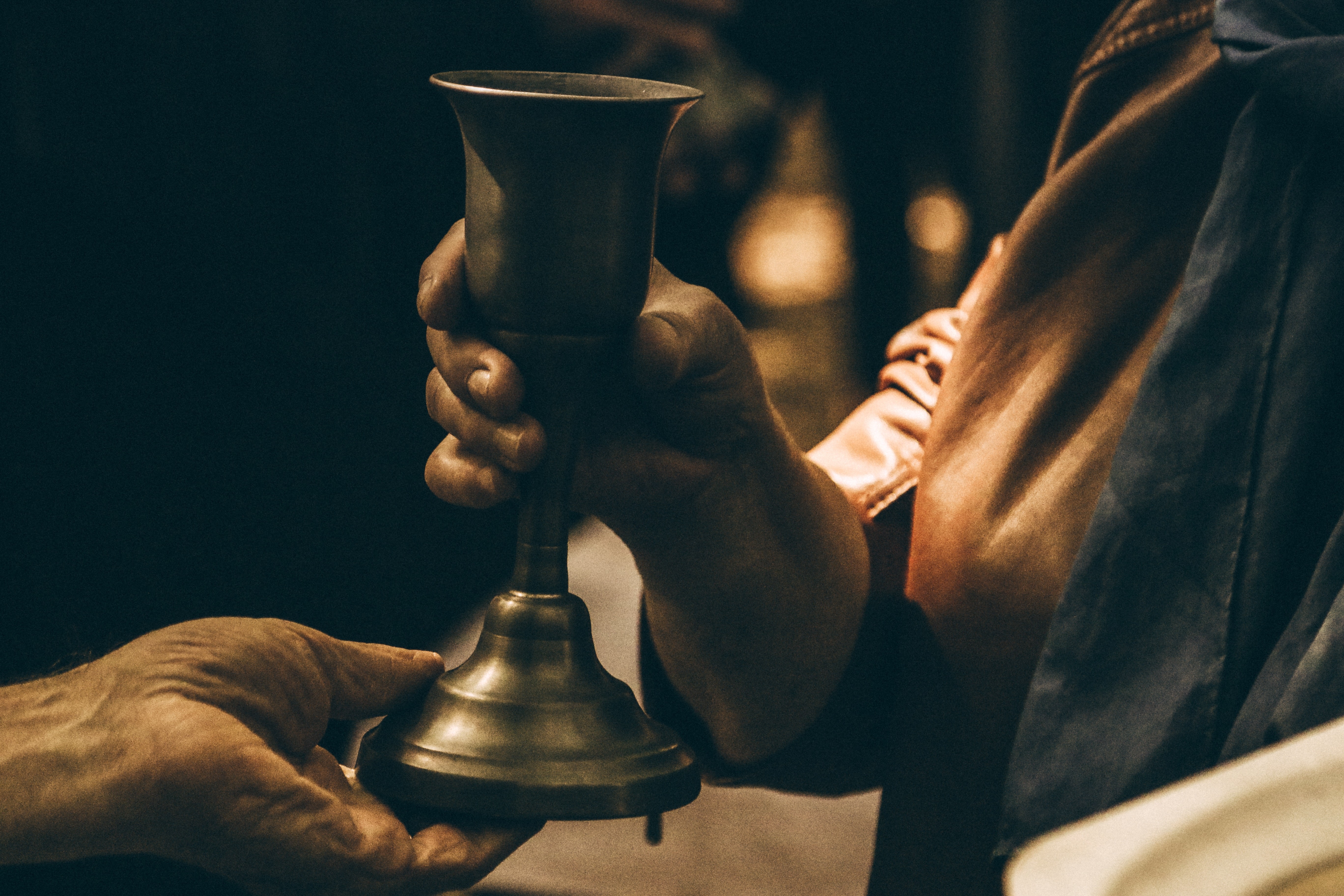 Holy Thursday, the Mass of the Lord’s Supper begins the Holy Triduum, a liturgy that lasts until the end of the Easter Vigil. As Jesus gathered His Apostles for the Passover Feast, He modeled for them what a life of service looks like by washing their feet. At this liturgy, the priest washes the feet of twelve parishioners to model his servant leadership. On this night, Jesus instituted the priesthood and the Eucharist and gave us the command to love one another as He has loved us. Jesus left us the most precious gift of Himself in the Eucharist. We hear Jesus instruct the Apostles to “do this in remembrance of me” and the Church continues to obey His command at every Mass. There is no dismissal at the end of this Mass, the faithful process behind the priest and the consecrated hosts to the Altar of Repose (in our Day Chapel) and remain in Adoration of the Blessed Sacrament. We “pray and watch” with the Lord knowing He is praying and suffering now in the Garden of Gethsemane. At midnight, Adoration comes to an end as the Passion of Christ begins. The altar is stripped to remind us how Christ was prepared for burial.
Holy Thursday, the Mass of the Lord’s Supper begins the Holy Triduum, a liturgy that lasts until the end of the Easter Vigil. As Jesus gathered His Apostles for the Passover Feast, He modeled for them what a life of service looks like by washing their feet. At this liturgy, the priest washes the feet of twelve parishioners to model his servant leadership. On this night, Jesus instituted the priesthood and the Eucharist and gave us the command to love one another as He has loved us. Jesus left us the most precious gift of Himself in the Eucharist. We hear Jesus instruct the Apostles to “do this in remembrance of me” and the Church continues to obey His command at every Mass. There is no dismissal at the end of this Mass, the faithful process behind the priest and the consecrated hosts to the Altar of Repose (in our Day Chapel) and remain in Adoration of the Blessed Sacrament. We “pray and watch” with the Lord knowing He is praying and suffering now in the Garden of Gethsemane. At midnight, Adoration comes to an end as the Passion of Christ begins. The altar is stripped to remind us how Christ was prepared for burial.
Good Friday
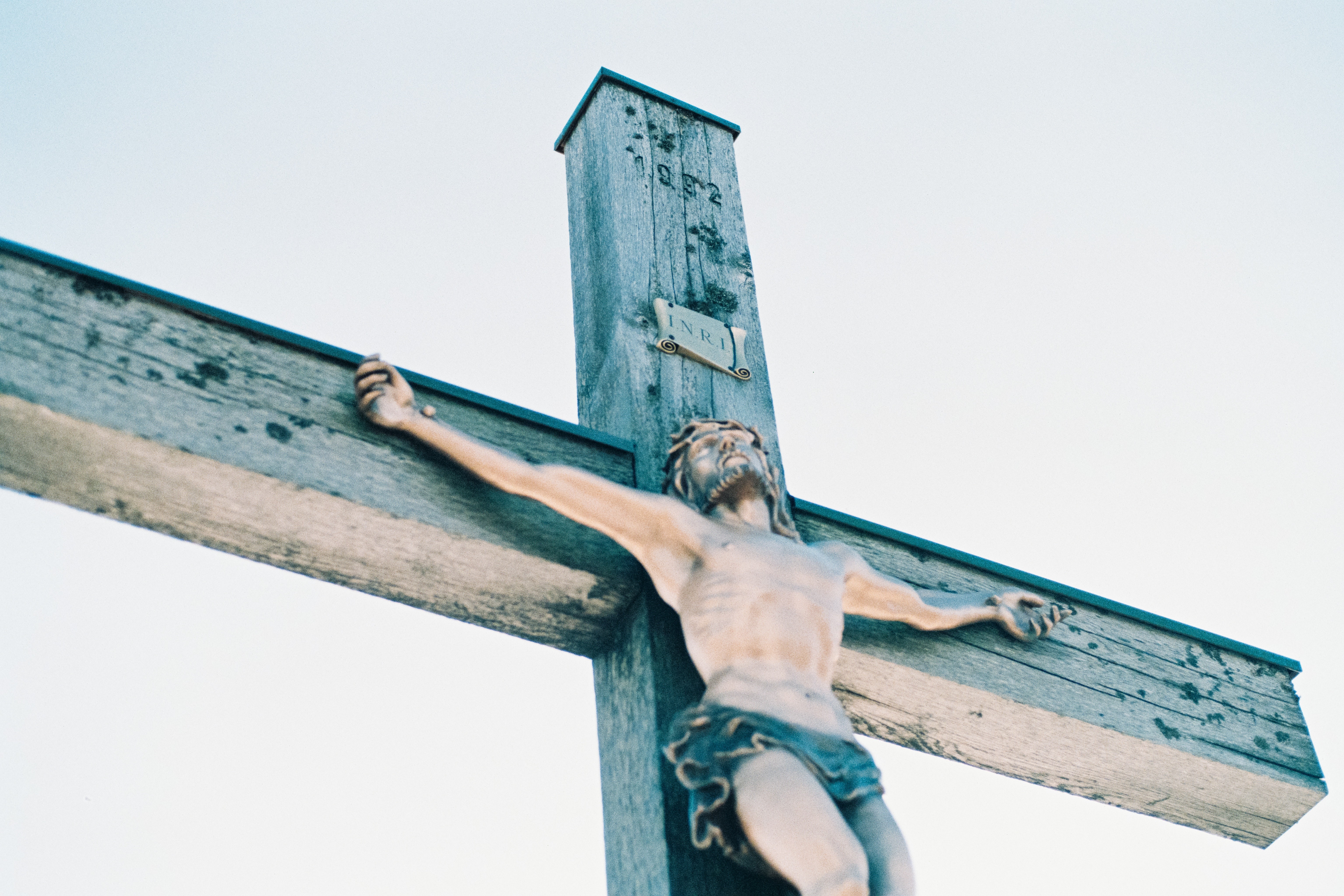 Good Friday is a day of mourning and all adornment of the church is removed. The statues are covered, the altar is bare, the procession into the church is in silence; we are in the depths of sorrow. Jesus has died for us on the cross. As the priest enters the church, he prostrates himself (lies down) on the floor in complete adoration of Christ. We venerate the large cross that has been carried into the church by bowing before it, touching it or kissing it in silence. It is a moment of such reverence for the sacrifice of Christ, that many cannot control their tears. There is no consecration today, the only day the Church does not celebrate the Holy Sacrifice of the Mass. Enough hosts were consecrated at the Mass of the Lord’s Supper for a communion service on Good Friday. We receive the Sacred Body of the Lord, and then the priest and everyone else leaves in silence. Good Friday is a day of penance where we have an obligation of fasting and abstinence. The cross remains in the church with four lit candles.
Good Friday is a day of mourning and all adornment of the church is removed. The statues are covered, the altar is bare, the procession into the church is in silence; we are in the depths of sorrow. Jesus has died for us on the cross. As the priest enters the church, he prostrates himself (lies down) on the floor in complete adoration of Christ. We venerate the large cross that has been carried into the church by bowing before it, touching it or kissing it in silence. It is a moment of such reverence for the sacrifice of Christ, that many cannot control their tears. There is no consecration today, the only day the Church does not celebrate the Holy Sacrifice of the Mass. Enough hosts were consecrated at the Mass of the Lord’s Supper for a communion service on Good Friday. We receive the Sacred Body of the Lord, and then the priest and everyone else leaves in silence. Good Friday is a day of penance where we have an obligation of fasting and abstinence. The cross remains in the church with four lit candles.
Holy Saturday
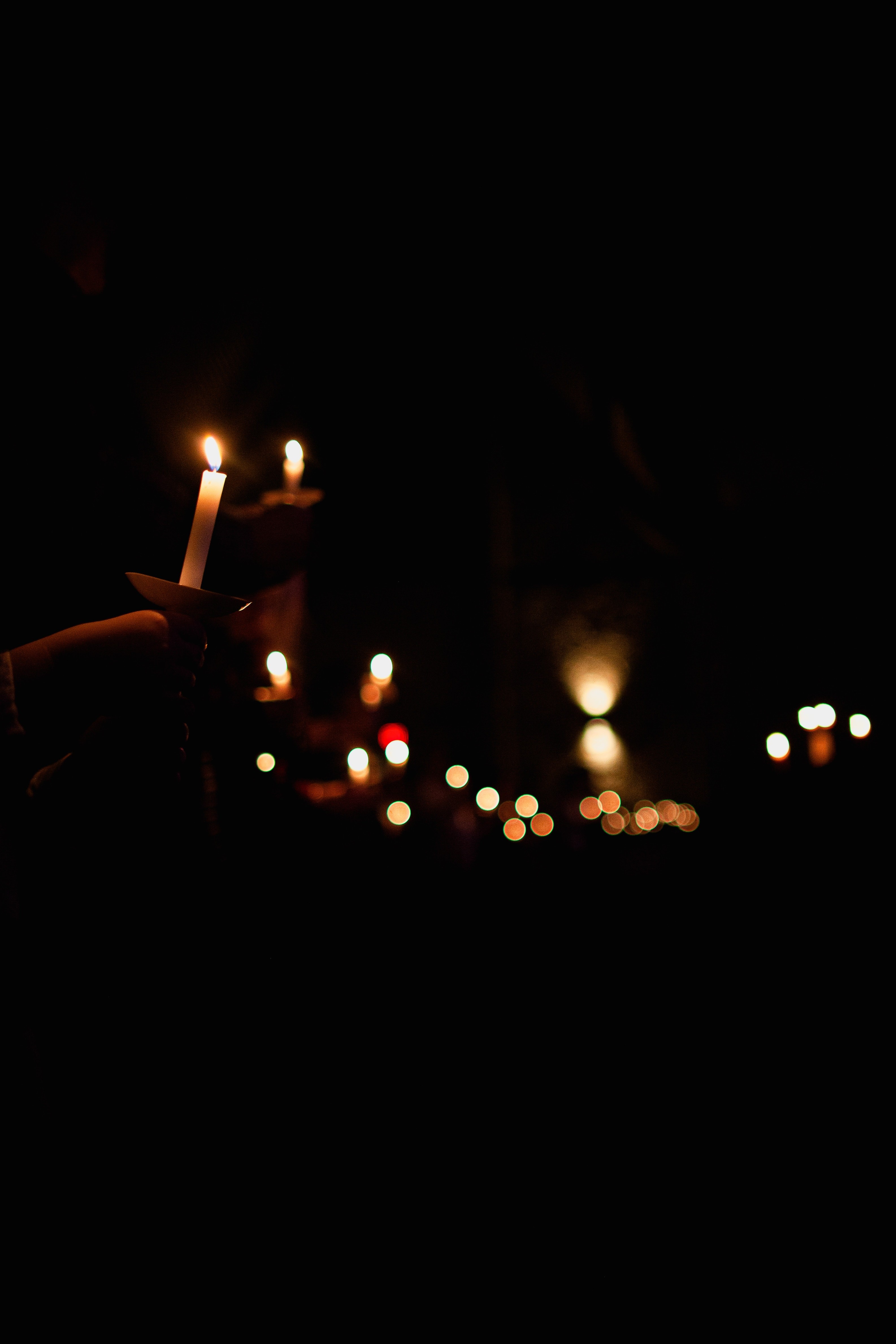 Holy Saturday, The Easter Vigil is a night of keeping vigil for the Lord, a night of staying awake during a time usually spent asleep, to keep watch and pray. The world is in darkness. Light from the darkness comes to us from the Easter fire, lit outside the church as night falls. This blessed new light is carried into the church as the flame of the new Paschal candle. Like a tiny mustard seed sprouting and growing, the light of Christ is passed from person to person until the entire church is aglow. The Easter Proclamation is proclaimed, also called the Exsultet from its opening phrase “Exalt! Let them exalt, hosts of heaven… Be glad! Let the earth be glad… Rejoice! Let Mother Church exalt!” The Exsultet tells us the story of Christ overcoming the power of darkness and wiping out all our sinfulness. As we wait for Jesus to rise victorious from the grave, we hear of God’s saving works from ancient times in the stories of creation, of Abraham’s test, of setting the Israelites free, of the prophets foretelling of Jesus all the way to the death and resurrection of Christ. We baptize the Catechumens and then confirm them along with our RCIA candidates. It all culminates in His eternal gift of self in the Eucharist and we then celebrate their first Holy Communion as new Catholics.
Holy Saturday, The Easter Vigil is a night of keeping vigil for the Lord, a night of staying awake during a time usually spent asleep, to keep watch and pray. The world is in darkness. Light from the darkness comes to us from the Easter fire, lit outside the church as night falls. This blessed new light is carried into the church as the flame of the new Paschal candle. Like a tiny mustard seed sprouting and growing, the light of Christ is passed from person to person until the entire church is aglow. The Easter Proclamation is proclaimed, also called the Exsultet from its opening phrase “Exalt! Let them exalt, hosts of heaven… Be glad! Let the earth be glad… Rejoice! Let Mother Church exalt!” The Exsultet tells us the story of Christ overcoming the power of darkness and wiping out all our sinfulness. As we wait for Jesus to rise victorious from the grave, we hear of God’s saving works from ancient times in the stories of creation, of Abraham’s test, of setting the Israelites free, of the prophets foretelling of Jesus all the way to the death and resurrection of Christ. We baptize the Catechumens and then confirm them along with our RCIA candidates. It all culminates in His eternal gift of self in the Eucharist and we then celebrate their first Holy Communion as new Catholics.
These are the holy and incredible liturgies we will miss this year. Our physical bodies may be barred from the building, but Holy Week will still be celebrated by our priests around the world in the universal Catholic Church. Holy Week, this year, has turned from my busiest week of the year to one of quiet, house-bound contemplation. I will watch Mass and respond and stand, sit and kneel, and I will read Christ’s passion and the Exsultet in my living room until we can assemble again as a community of faith. But will this time of working from home and making sacrifices that I didn’t voluntarily offer to make for Lent change me when I am able to return to Mass? Every Sunday of the year is a celebration of Easter and the resurrection of Christ. Will I enter the Mass every Sunday with the same joy and celebration of the followers of Jesus on Palm Sunday? Will I show Jesus that He is the King of my life? Will I envision the Archbishop, my Father in Christ, at every baptism that takes place at my parish? Will I remember the sacred promises that Father Bedel and Father Pasala made at their ordination and respect their roles as my spiritual fathers? Will I look at ways that I might be betraying Jesus for the price of a slave when I sin? Will I let the vices I gave up during Lent creep back into my life? Will I take the ability to receive the Eucharist at Mass daily for granted anymore? Will I follow Christ anywhere, the same way I followed Him out of the church to the Altar of Repose? Will I prostrate myself in complete reverence, even if just mentally, the way my priests do on Good Friday after I receive Holy Communion? Will I embrace the crosses in my life, the illnesses, the death of loved ones, broken relationships, and bear them the way that Christ did? Will I make room in my life every day for a few minutes of sacred silence to pray and watch with Christ?
The creativity we are using right now can help us to incorporate Holy Week into our entire year. We have become better, holier, and closer to God during Lent, and we must let it guide us in the Season of Easter and Ordinary Time. Join the Church spiritually as she walks with Jesus through this blessed Holy Week. Accompany Jesus through the Stations of the Cross from your home. Hear the story of how Jesus instituted the first Eucharist and learn from His example of humble service via livestream. Venerate the cross you hang in your own home on Good Friday and attend the glorious Easter Vigil virtually this year. Keep Holy Week in your heart throughout the year and you will unwrap daily one of God’s gifts given amid our current adversity.
Written By: Birgitt Hacker
More News...
Eucharistic Minister Training
Training for new Extraordinary Ministers of Holy Communion (EMHC) is Sunday, October 26 from 2:00-4:00 pm in the Fr. Jan Conference Room (just inside...Read more
Welcome Retreat Weekends
Welcome is a Spiritual Renewal process for men and women that St. Margaret of York Parish hosts in November each year.
Retreat weekends...Read more





